Cases
In 2020 support from a state agency, through the Creative Ireland Programme, funded research into Irish singing groups and their connection with, and understanding of, the needs of older adults. It asked about older adults in social singing groups and choirs, and the opportunity for singing in health care or for health benefits.
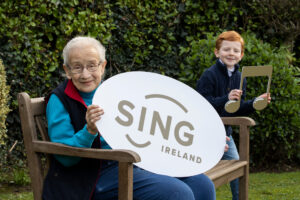
From this data, Sing Ireland working with Creative Aging International, identified gaps, opportunities, interest and need. They decided to develop support around four themes:
- The Ageing Voice – this focused on the voice as an instrument, what happens as we age, and how the voice can be supported and maintained.
- Special Interest Choirs – this explored choirs for people living with health conditions, including Alzheimers and Dementia.
- Community Connections – this explored the community connection made through singing together.
- Singing For Care – this focused on singing in health care settings in Ireland.
A series of focused interviews followed with people who were leading or participating in noteworthy projects that illustrated areas of learning and development for those interested in this area. Desk research identified easily available and freely accessible resources that would support people to develop their practice. Learning the interviews and research was combined into four publications, which are available free of charge on the Sing Ireland website.
Alongside the publications of these resource materials, Sing Ireland hosted public discussion, and then created online webinars which included training and awareness raising sessions relating to each theme. These were recorded and are available to view, together with supporting notes from the webinar leaders.
A short video was made that articulates the issues of each thematic area, and the benefits that can arise from singing. Where possible the voice of the participant and the project lead was central.
Finally all resources, the guidebooks, videos, webinar recordings and notes were added to Sing Ireland’s website where they can be watched, read or downloaded.
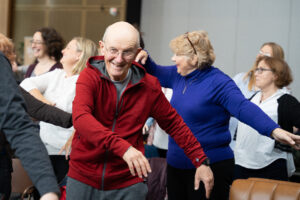
This work took place during covid between 2020 and 2021. There is ambition to further develop the programme by commissioning new repertoire for older voices and building education and awareness support around the new commission.
The benefit of the project is in collating existing activity that is of benefit to older people, for instance singing in community choirs or in health care, then articulating what can be done to support and develop this activity by sharing existing information and knowledge. Achieved quickly, with minimal investment it offers a foundation for further development.
Beyond this by including choirs focused on supporting health wellbeing along with more general singing groups and choirs, it seeks to reduce stigma and to develop awareness and confidence in supporting a range of additional needs and requirements. The work also seeks to showcase how the pleasure of being involved in a choir can be maintained across the spectrum of conditions we may find ourselves facing as we grow older.
For further information:
- Website
- Ageing Voices Resources homepage
- The Ageing Voice page
- Special Interest Choirs page
- Community Connection page
- Singing For Care page
Dermot O’Callaghan, CEO, Sing Ireland – info(at)singireland(dot)ie



Managed by Uillinn West Cork Arts Centre, Arts for Health runs all year round and is delivered by a team of professional artists from different disciplines.
Access to and engagement with the arts in healthcare settings improves the quality of life for individuals in residential and long term care. It encourages conversation and important links with the wider community. By being integrated into the culture of the care setting, the programme allows ideas and the individual creative interests of the participants to be nurtured, developed and implemented over time
Founded on a principle of equal partnership between arts and health sectors, arts and health is a specific field of work that is characterised by clear artistic vision, goals and outcomes that seek to enhance individual and community health and well-being.
An Arts for Health programme lends itself to partnership by its very nature.
Delivery of this programme is through an Arts for Health artistsʼ team which is managed by Uillinn West Cork Arts Centre. The programme coordinator has established a close, professional working relationship with the staff and management of each care setting. Likewise the artists, each with distinctly different practices, have developed their professional expertise in working with older people and numerous individual and collaborative projects have been undertaken since it began in 2005.
The Arts for Health partnership model reflects a sustainable approach to arts and health provision, demonstrating a proactive way to make best use of locally embedded resources and expertise. The management structure and inter-agency partnership exists to implement, develop and promote the Arts for Health programme in line with the policy objectives of partner organisations. In addition to all agencies serving our communities, commonality lies in goals that support strategic partnerships, commitment to research and development and sustainable programming.
This effective partnership comprises Uillinn West Cork Arts Centre, Cork County Council, Cork Education & Training Board and Health Service Executive (Ireland publicly funded health care service). HSE is represented through Cork South Community Work Department, Nursing Directors of Community Hospitals and Day Care Centres, Community Services, West Cork and was initiated with the Health Promotion Department.
Each partner has independent motivation for being involved. They describe their vision, rationale and guiding strategies for participation in the Arts for Health Partnership Programme on the website. A reflection of their commitment and transparency.
Intrinsic to the Arts for Health programme is learning for all; participants, artists, healthcare professionals, management and advisers.
As learning needs are identified, they are addressed through a various structures, such as peer to peer learning sessions, mentor programmes, placement programme, training days, conferences, accredited courses and network meetings. Again this infomation is shared on their website.
The programme identifies 5 groups that it is in service to:
- Family – Family Carers and hospital visitors are invited to take part in the programme. Hospital activity sessions are promoted as a shared activity and reaching out to the wider community is welcomed. Family Carers can engage in a wide range of activites including a new ‘at home’ and arts centre based creative sessions.
- Healthcare professionals – Healthcare professionals play a vital role in enabling the residents and service users to participate in the programme, they support the programme manager and artists in delivering the programme. There are also activites as part of the programme that faciilte their creative learning and engagement.
- Arts professionals – Arts for Health is delivered by a team of professional artists, each with distinctly different practices, who have developed their professional expertise in working with older people. Guest artists joingthe programme adding to the diversity of choice and collaborative oportunities.
- Participants – Participants are placed at the centre of the programme, their wellbeing and choice being paramount. In general, participants are older people aged 65 years and over, who reside in hospitals or attend one of the day care facilities in West Cork. All are invited to take part and are welcome to sit in during sessions. If their health does not permit them to actively participate, they are encouraged to chat or just observe what is occurring during sessions.
- Participants – There are over 400 Arts for Health participants from both community hospitals and day care centres. Everyone in the healthcare setting is welcome to participate in the programme.
Improvements reported from participating in the programme include pleasure in the activity, increased socialisation, reduction of isolation, improved memory and eye-hand co-ordination, enhanced relationships with family members and staff and increased self-esteem.
Their website captures projects and is intended to give a snapshot of the variety and depth of the work that take place as part of the programme.
Less easy to document is the work that takes place on an ongoing basis alongside the projects. Work that facilitates individual creative explorations, bed-side support and studio time where people can follow their own artistic lead. Playful or studious, participants can work independently, supported by a well resourced environment and skilled artist facilitators.
Since March 2020, the work has been conducted remotely and or at a distance. This method of practice is supported by the healthcare professionals playing a more active role on-site working to support the artists delivery ensuring the work remains meaningful and relevant.
Further information:
Justine Foster. Uillinn, West Cork Arts Centre, Skibbereen, County Cork, Ireland
info(at)westcorkartscentre(dot)com
www.twitter.com/artsforhealthw1
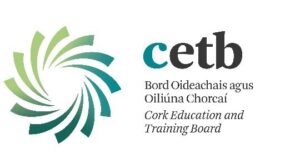
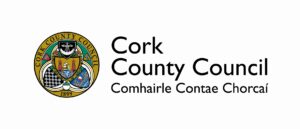

When people feel connected to their communities they feel safer and stronger and are healthier.
It is a city-wide project, funded by the local authority, whose projects have a fundamental commitment to equity and engagement.
It rarely creates intitiaves specifically for people with alzheimers or their carers. Instead it sees them people with healh conditions as citizens, and therefore they have a human right to be involved in all and any of its programmes if they so wish.
They offer a road map for sustainable and healthier connected communities achieved through the co-creation of cultural offer.
A city council initiative, it grew a bid to become a European City of Culture. The approach to developing the bid, which sought information from all citizens using creative means, convinced the city leaders to sustain the project further.
Incorporated in 2018 it now manages several projects, some programme and a few premises. It collaborates with people, communities, cultural organisations, business and Dublin City Council to embed cultural experiences and increase culture participation through out the local authority area.
Dublin City Council Culture Company have five goals:
Engage, Experiment, Learn, Share, Embed
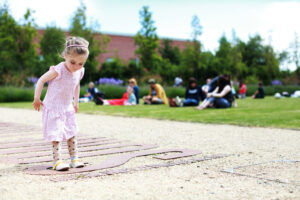
Working “with, through and for people in Dublin” they are a values led organisation built around Participation, Partnership, Relevance, Capacity-Building and Quality.
They put people at the centre of culture. Collaborating with people, communities, cultural organisations, businesses and Dublin City Council to increase cultural participation and embed cultural experiences into the lives of all who call Dublin home.
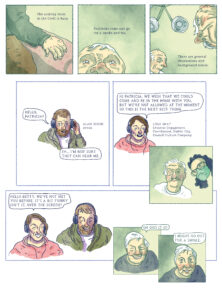 They connect people and communities through culture and conversation. Cultural experiences and participation has been shown to have a positive impact on health and wellbeing, social relationships, belonging, community cohesion and pride of place. DCCC are an example of how to connect existing resources in innovative ways, and beginning to reveal what happens when you do.
They connect people and communities through culture and conversation. Cultural experiences and participation has been shown to have a positive impact on health and wellbeing, social relationships, belonging, community cohesion and pride of place. DCCC are an example of how to connect existing resources in innovative ways, and beginning to reveal what happens when you do.
Their ambition is to listen, explore and learn about what’s important to the people of Dublin. Through Tea & Chats and our other conversation based programmes, such as Your Tenement Memories and Our City Our Books, they have year-round conversations with groups of people across the city about their thoughts and ideas on the city and culture.
These conversations are the foundation of their work. This ongoing consultation process informs the development of cultural programmes and projects, guides their work and ensures that the people of Dublin remain at the centre of all that they do.
They constantly record their work and methods to evaluate outcomes and inform future work. When they make a project they try to document it in the most appropriate way so that they can share learnings. Sometimes this results in videos, reports, case studies or even pictures.
These are collated on their website and social media, as they may be interesting or useful for other organisations, community groups, and artists. These resources range from systemic approaches to information gathering like the Dublin Cultural Audit and Map, or tips on fundraising, to documentation of inspiring projects.
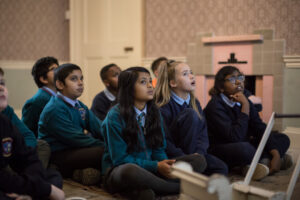 The Cultural Audit and Map is significant in that it adds to Dublin City Council’s knowledge base. It is informing decisions by the city council departments, planners and strategists. Therefore real time engagement of people in the conversational projects impact the longer term strategy, planning and development programmes.
The Cultural Audit and Map is significant in that it adds to Dublin City Council’s knowledge base. It is informing decisions by the city council departments, planners and strategists. Therefore real time engagement of people in the conversational projects impact the longer term strategy, planning and development programmes.
This intelligence project is also a public resource, a website called Culture Near You, that makes the city’s cultural buildings, organisations and networks easier to find and connect with.
The Cultural Map and Audit works within the existing mapping and Geographical Information Systems (GIS) of Dublin City Council. It was developed using a ‘cultural mapping’ process and the public are invited to add to and update this data via Culture Near You.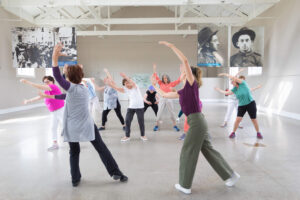
Dublin City Council Culture Company are committed to take the ideas of artists and creative beyond the cultural spaces. To date projects have taken place in hospitals, residential care, schools, community centres and also in academies for training the legal profession, in sports and wellbeing centres. Bringing creative minds into these areas is facilitating a re-imagining of what the culture of the city can become. This is an inclusive re-imagining. The impact of stigma is reduced because of it. The opportunity to build connection and networks improved. The possibility of building a city that is better informed about the needs of its citizens, whether they are in health or illness, is dramatically improved.
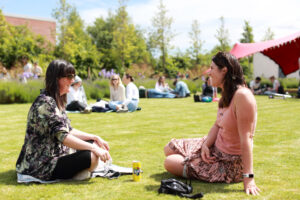
For further information:
Dublin City Council Culture Company, 14 Henrietta Street, Dublin 1, D01HH34 – info(at)dublincitycouncilculturecompany(dot)ie
Website: www.dublincitycouncilculturecompany.ie/
Cultural Audit and Map: www.dublincitycouncilculturecompany.ie/what-we-do/programmes/cultural-audit-and-map
Culture Near You: www.dublincity.ie/culturenearyou
© Dan Butler Photography – All rights are reserved.
